Truthdigger of the Week: Daniel Ellsberg
For our first Truthdigger installment of 2012, we salute Daniel Ellsberg, who has taken a page from his experience with the Pentagon Papers and is still busy serving up a bracing dose of truth to power, most recently with his support of accused WikiLeaker Bradley Manning.For our first Truthdigger installment of 2012, we salute Daniel Ellsberg, who has taken a page from his experience with the Pentagon Papers and is still busy serving up a bracing dose of truth to power.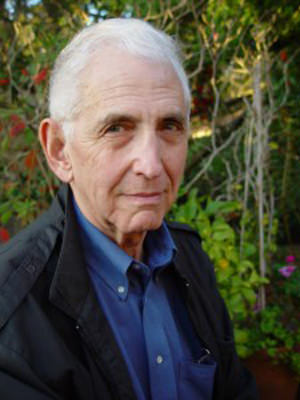
For our first Truthdigger installment of 2012, we salute Daniel Ellsberg, who has taken a page from his experience with the Pentagon Papers and is still busy serving up a bracing dose of truth to power, most recently with his support of accused WikiLeaker Bradley Manning.
It’s not like Ellsberg ever hung it up after passing the explosive 7,000-page work of revelations about the U.S.’s involvement in Vietnam to the major American news media 40 years ago. In fact, he’s been quite busy, as you can see here and here. He has also composed a few pages of his own, as the author of three books — one of which, “Risk, Ambiguity and Decision,” is his doctoral dissertation. Ellsberg is one of those fortunate few whose major life decisions dovetailed with history in a way that proved beneficial for both the actor and the era in question.
Thus, it’s in keeping with his life’s ongoing legacy that Ellsberg would turn up again in the headlines in relation to Pvt. Bradley Manning, who also risked more than his own career to let the world in on some of America’s less lofty activities on the global stage. Ellsberg paid a visit late last month to the military courtroom at Fort Meade, Md., where Manning’s pretrial hearing was held, and on Friday, he told Truthdig’s Kasia Anderson about the parallels he sees between his story and Manning’s and about their brief, if interrupted, interaction.
Kasia Anderson: So for people who don’t know, tell us about your take on Manning’s case.
Daniel Ellsberg: Well, it’s a pretrial hearing, supposedly to decide whether they had enough evidence to go to a court-martial, which seemed pretty much like a foregone conclusion. The decision hasn’t been handed down yet; it will be within weeks, I guess.
I would have said that the real question is whether they should be in this process at all at this point. If the chat logs that were handed over by Adrian Lamo — the informant — are valid, and the prosecution is relying heavily on those but not entirely, it would seem clear that Bradley Manning violated various military regulations. He’s also accused of violating the Espionage Act. It was passed in 1917, and for over 40 years it was used only as intended against espionage. But my case in 1971 was the first attempt to use it against a leak, a disclosure to the American public. And really, this trial is really the first reenactment of my trial, because like the Pentagon Papers case — not the civil case but the criminal case involving me and Tony Russo — we have here a very large-scale disclosure. In my case, 7,000 pages of top-secret documents, and in his case hundreds and thousands of tables and reports, and it reflects the larger scale that’s possible in the electronic age. In between, for 40 years since my case, there hasn’t been another really large-scale disclosure like this. There’ve been, of course, almost daily leaks, many of which involve documents, and many don’t. Even when they do, it’s usually a matter of a page or two — there hasn’t been such a large-scale disclosure. This is the first one that’s happened since then, and it’s the first leak prosecution that’s involved such a large disclosure. So, they’re sort of retrying my case.
Given the chat logs, and if they are valid, then what amounts to an acknowledgment — if he is the author of those, as the prosecution is claiming — then they have enough evidence to start an indictment. … But that all was started close to two years ago in April when they arrested him. And in the meantime, there were a couple of events that I say should have terminated this proceeding. First, the president publicly pronounced Manning as having broken the law, as being guilty, even before he had been put on trial or before any evidence had been tested in court. Since he’s the commander in chief, that virtually amounts to a directed verdict — what they call improper command influence. The remedy for that should be an end to this court-martial — that won’t happen — but if it had been a general saying that, it almost certainly would have moved the process out of his jurisdiction at least.
But more important, [Manning] was treated abusively — I would say illegally — for over 10.5 months of prolonged isolation, which amounts to torture, during which and after which they have not allowed the United Nations rapporteur to see him or to investigate those conditions. Obviously, they don’t think it merits investigation. It just so happens that your honoree from last week, [Rep. Dennis] Kucinich, also tried to see him and was refused — showing a situation, I would say, in which they can’t allow it to be exposed.
I would say that this trial started the same way mine did, and it should end the same way mine did, which is that the charges were dismissed on the grounds of governmental misconduct. There’s been very clear governmental misconduct of a prolonged kind here. But of course they won’t — that would be admitting their guilt, and the government is not ready to do that.
So we’ll see a trial, and a lot of the same issues will come up, as well as some other ones. [In the military], disobeying or violating practically any rule or order is regarded as a crime for which he can be imprisoned or even executed. So it would be very hard, given what we’ve heard so far, for the defense to argue that he didn’t violate any regulations. I certainly violated regulations of the classification system, but for me as a civilian, that didn’t correspond to a criminal statute. And what the [Nixon] administration first tried to do in my case was to treat the Espionage Act as if it were an official secrets act. In my case it was ended by governmental misconduct, so the legal issues weren’t addressed at any level. And then prior to Obama there were just two other cases, one of which carried over into the Obama administration and was withdrawn by that administration, which was the case of AIPAC that was dismissed.
There’s only been, in the 95 years since the act was passed, exactly one jury conviction for a leak, and that was Samuel Loring Morison, 10 years after my case. That was never reviewed by the Supreme Court. The Supreme Court has never reviewed whether that would be constitutional, and there are strong arguments from various legal scholars that that act should be regarded as unconstitutional in violation of the First Amendment, which is supposed to make it hard for the government to keep information from the public.
Here’s the question: Did I break the law? Most people assume I did, because they assume there was some law — actually, Congress has never passed such a law, but the Espionage Act can be read as a law. The wording of it can easily be read to apply to leaks to the public, but it wasn’t intended for that. And in our system of government, there is a constitutional principle that you might restrict some kinds of communication — speech or press — as espionage, but that can’t be done without a clear intent of Congress to do that. But in this case, you can’t do that. It wasn’t intended to keep information from the American public. Is that not an infringement of the First Amendment? Well, many think yes, it is, but the Supreme Court hasn’t ruled on that. In the Nixon case, he did an experiment to see if maybe he could get away with that, test it. Still, it hasn’t been done, and before Obama there were three such cases. Obama has brought five cases in two years … and he’s investigating whether to bring a sixth one against Julian Assange from WikiLeaks.
So, he is involved in a war against leakers, against whistle-blowers.
Anderson: Why is this happening now?
Ellsberg: I’ve asked many people about this, and nobody knows. All presidents have hated leaks and leakers, but they’ve generally concluded that they don’t have a law with which to punish them. Obama is using the Espionage Act with the assumption that it can be read this way. I think he’s assuming that it’s intimidating enough for people to go through this process, that even if they’re vindicated, it’s an intimidating process that’ll deter them. He’s brought five cases. That’s not because there are more leaks now than before, or that he’s the first president to be enraged by them — not because they’re more serious than they used to be. We went through the whole Cold War with the Soviet Union with two cases — mine and one other. What we have is Obama totally violating his promise to run a more transparent government. This is one aspect of that. He is being as opaque and secretive as any administration we’ve ever seen, perhaps more so.
And how bad is that? I would say that it’s very bad, if he succeeds. I’ve felt for a long time now that we need much more whistle-blowing. Much more unauthorized disclosure of a classified nature of a sort that reveals government wrongdoing than we’ve ever had. I obviously do feel that I did the right thing in putting out the Pentagon Papers. That’s more widely acknowledged now. It certainly didn’t hurt the U.S. in any way, and it contributed to shortening the [Vietnam] war. The question is: How often do you need a disclosure like that — every 40 years? I would say once a year would be better.
I would say that Bradley Manning took the same attitude I did, which was the willingness to take a personal risk in order to inform the public, in order to affect events and save lives. We’ve had a number of wars that would have been averted if we’d had a Bradley Manning, and preferably at a higher level, with access to this information. I think there wouldn’t have been an invasion and an aggression against Iraq; if people knew that this was a disastrous course, that would have averted the war if it was done before the war. Likewise, the escalation in Afghanistan was done in opposition of most of the president’s military and civilian advisers, and I think if they had brought out their own opinions to the public, preferably wtih documents, we wouldn’t have put out this extra 40,000 troops, and lives would have been saved on both sides. In both cases, we’ve benefited from memoirs and investigative journalism, such as from Bob Woodward and Sy Hersh, that shows how many people knew we were heading off a cliff, but they didn’t tell us at the time. They told Woodward or Hersh or otherwise years after it was too late to stop them. I think in almost every catastrophe you can think of — even natural ones like Hurricane Katrina — there were warnings beforehand about how inadequate the preparations were. People knew what would happen. In almost every case you look at — Fukushima in Japan would be another case — there were plenty of people able to give the warning but just didn’t do it loud enough. They may have given warnings internally, but when people were ignored, as they were in both those cases, they didn’t risk their jobs to go public.
I read Bradley Manning say, in the chat logs, that he was willing to go to prison for life or even be executed. He is facing life in prison or even the possiblility of death — it’s a capital offense that he’s charged with, and the judge in the end could give him the death sentence. I thought, here’s a guy who was in the same state of mind that I was in 40 years ago, and I think it’s absolutely appropriate. You should be willing to take this risk when there are this many lives at stake.
My main point is we need more such decision-making, not less, and Obama’s efforts to assure we’ll have less truth-telling than before is frankly a death sentence to a lot of people in the world, Americans and others, because it’s a recipe for more disastrous policies like Vietnam, Iraq and Afghanistan — and I would say what are you doing in Pakistan with the drone attacks? — that are disastrous and could be averted by more truth-telling. Frankly, it will always take courage to do that, to tell a truth against the wishes of a boss — which is the essence of whistle-blowing and is always going to be risky. It doesn’t always involve imprisonment, but just the prospect of losing your clearance, your career, very often your marriage or your children’s education, your standing and your peers is enough to keep people quiet about dangers and crimes.
Anderson: What happened in your encounter with Manning in the courtroom last month?
Ellsberg: Did you read that I was expelled? People didn’t know why. It was very simple. I of course didn’t have a chance to talk to Bradley — essentially nobody but his family and his lawyer had. So, I did want to let him know that I was supporting him. And he was looking straight ahead, as he always did, and the lawyers were out of the room in a conference with the judge. So he was just sitting there with one military lawyer next to him, and I went up to him and tapped his chair and said, “Hi, Bradley, I’m Dan Ellsberg.” Well, before he could even turn around, I was jerked out of the room by two hefty military police. And I said, “What’s this about?” They said. “It’s against the rules.” I said, “It didn’t occur to me there was such a rule,” and they showed me a run-down, which said, “Don’t chew gum, [etc.]. …” I said, “I don’t see anything here that says ‘Don’t talk to a defendant.’ ” One of them said, “Well, it’s a norm.” I told them I was a defendant in a case like this for five months and nobody protected me from conversing. It’s a general rule — they want to have as much control over [Manning] as possible. His lawyer said he was sure I wouldn’t be able to talk to him.
So, I questioned whether there was such a rule. A guy in charge of security said, “Well, now you’ve been warned, so you can go back in.”People write about this as though it’s very obscure what his motives were. He’s really very explicit in the chat logs as to what his concern was. He saw torture, atrocities, corruption at all levels, and he felt the public should have this information. You need this information to make decisions. And he was prepared to pay the price. I see the same motives I had, and I admire him — he’s a hero of mine. And I certainly haven’t heard anything since then that diminishes my feeling about it.
Anderson: What would you say in response to the argument that leaking this kind of classified information puts people, particularly our troops abroad, in danger?
Ellsberg: Oh look, they will always say that, of course, for virtually every leak that occurs. But it’s very, very hard to find an example of any leak that actually had this dangerous effect. It does have some plausibility — one can’t say it’s impossible. There is always a risk of putting information like this out, that it could be harmful. This was said about the Pentagon Papers, and nothing did emerge. Certainly they were warning that it was very dangerous to be putting out information that included names of informants in Afghanistan, and I would say that was a risk. Fortunately, it does not seem to have resulted in any harm whatsoever, but that isn’t to say that it was impossible.
The other side to that is that keeping all this information secret didn’t just have a risk — that kind of secrecy led us into war and to enormous loss of life and has prolonged it since. You have to balance, I think, the dangers of concealing this information and the possible risks of revealing some of it. So far we haven’t seen any examples of actual harm as a result of [Manning] releasing it, and on the other hand, in at least two ways there have been enormous benefits: First, the contribution of the cables revealing our knowledge of Tunisian corruption, in the Tunisian dictatorship that we were supporting for years of [Zine el-Abidine] Ben Ali. That revelation led to weeks of controversy and debate, and in Tunisia there was even an underground website, TuniLeaks, that preceded the immolation of Mohamed Bouazizi, who was protesting corruption, and that of course led to the uprisings and the ouster of Ben Ali.
There are a number of articles I’ve read that say there were two people, two revelations — Mohamed Bouazizi, and weeks earlier, we could say Brad Manning. … So, Bradley Manning and Bouazizi, I’d say, together could be persons of the year in the sense that they were critical to the protesters who were being celebrated over there. And of course Tunisia fed immediately into the Egyptian uprising — again, nonviolent demonstrations which led to the downfall of another dictator. And in turn the occupation movements around the Middle East were the inspiration for the Occupy Wall Street movement here, which showed a kind of mobilization we haven’t seen since the anti-war movement, I’d say. So, the revelations were a contributor there — a bigger effect, one could say, than the Pentagon Papers had on the Vietnam War. These are real-world effects, changes of the world for the better. This was not the immediate result of the Pentagon Papers, which affected public opinon but didn’t affect Nixon’s policies.
Then there’s yet another effect here. There was understandable criticism — which I shared, actually — of the release of all the State Department cables, which were more than any one person could have read. They were called an “indiscriminate dump” of information that looked potentially harmful. I probably wouldn’t have done that, and I can understand that it’s reasonable to criticize that. Nevertheless, there’s been no evidence of harm, but on the other hand, one of the cables that came out in that so-called “dump” that hadn’t come out earlier was the revelation that the U.S. was aware of an atrocity by American troops in 2006 in Iraq which had led to no prosecutions and which the government had lied about. Well, it was that cable that led [President Nouri al-Maliki] in Iraq to say he could not afford to give immunity to U.S. troops, and that meant we had to get the troops out by the end of last year. Our troops would not be out without that “indiscriminate dump” from that cable.
So, here’s a case that led to a very similar action [as mine] with a similar motivation, but in his case we can point to direct effects from that action which I would hope would be an inspiration to try to do the same. Of course, they’re going to do their best to make sure that people don’t imitate him by piling on the charges and by outrageously accusing him of the offense of aiding the enemy, which carries a possible death sentence. Well, the people who aided al-Qaida are the people who invaded Iraq. Nothing could have done so much for al-Qaida, literally nothing, than that occupation, and by that standard it’s Bush and Cheney and Rumsfeld [who aided al-Qaida]. I’m not saying they’re traitors — they didn’t intend to aid al-Qaida — but I think they were stupid enough to ignore that end result. But to accuse Manning of doing that as if he were a traitor is, I think, outrageous.
What they’re mainly trying to do is intimidate him into cooperating and incriminating Julian Assange and WikiLeaks, and they haven’t so far succeeded in doing that. I wouldn’t criticize him if he did cooperate in order to get less than a life sentence, but he hasn’t chosen to do that, and that’s one more reason to admire him, I’d say. It seems to me he could easily lower his sentence if he cooperated with the government, and even if he gave them exactly what they wanted, whether it’s true or not — it’s what they’ve been trying to do by putting him in isolation, torturing him and with threatening him. I can only infer that he thinks he knows what he did was right for him to do and that he thinks Assange and WikiLeaks, if he cooperated with them, were doing the right thing, and he’s unwilling to cooperate in subjecting WikiLeaks and Assange to the kind of punlishment that he’s facing. That’s what I infer — they won’t let me ask that question! But that’s the way I make sense out of it.
Your support matters…Independent journalism is under threat and overshadowed by heavily funded mainstream media.
You can help level the playing field. Become a member.
Your tax-deductible contribution keeps us digging beneath the headlines to give you thought-provoking, investigative reporting and analysis that unearths what's really happening- without compromise.
Give today to support our courageous, independent journalists.
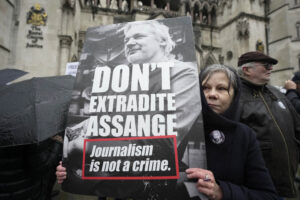
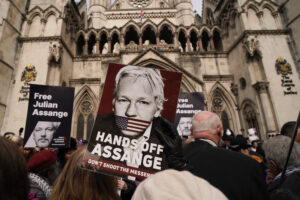

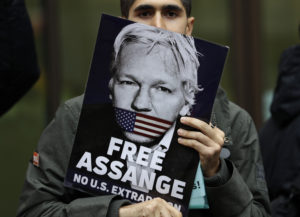
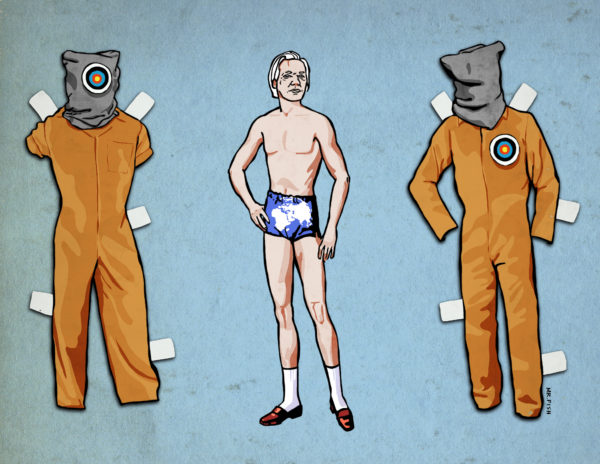
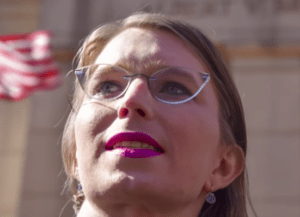
You need to be a supporter to comment.
There are currently no responses to this article.
Be the first to respond.